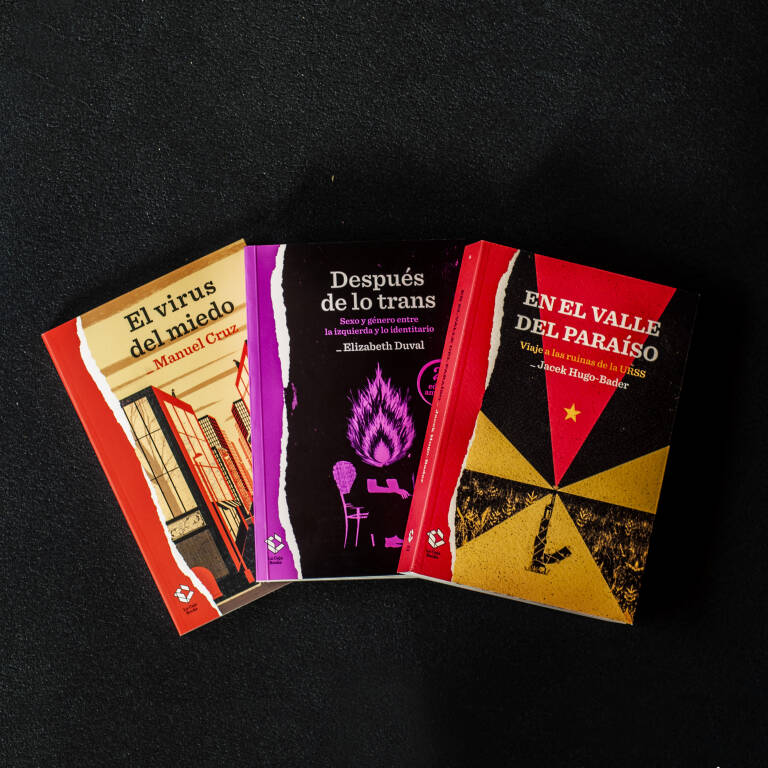VALENCIA. Three years ago, in 2018, La Caja Books was born, a Valencian publishing house belonging to another, larger one: Group. Under the imperatives of “Open, read, feel, think”, this editorial started from the idea of creating a series of cardboard boxes or packs that contained three short books on the same topic.
Due to circumstances of telework and mobility, Raúl E. Asencio, Editorial Director of La Caja Books, is on the other end of the video call. “The boxes were born as the engine, the beginning of the idea of setting up the publishing house. The problem with this format is that the bookseller did not know where to place them. The books worked better on their own. ” La Caja de la Nostalgia, La Caja del Fútbol, La Caja de la Bicicleta, La Caja de las Rebeldes and La Caja de la Utopia were these collections that brought together authors as diverse as Ivan Repila, Aixa de la Cruz, Éric Fottorino, Galder Reguera O Pablo Simon. “Although we did not get rid of the idea of editing a box. It will be otherwise, when we find three books that talk to each other ”.
The guideline to configure the catalog does not respond to a previous structure. “It has been done on the fly. It was born with the idea of boxes, different approaches. But in the end, a publisher publishes what it can, not just what it wants, and it has to find its niche of readers. The catalog of La Caja has been balancing out ”. At a glance, the repertoire is especially Balkan and Communist. What does that region and that period of history have so that they have a not inconsiderable collection of true stories that take place in Siberia, Bucharest or Albania? “I’m going to answer you with a reflection by Jacek Hugo-Bader —Author of wonders like Kolyma Diaries: Hitchhiking Through Extreme Russia, O In the valley of paradise– When he came to Spain and was asked the reason for this fixation with the dismembered countries of the Soviet Union, he replied that very rarely do you have the opportunity to see the fall of an empire in almost real time. Due to historical circumstances, we are very close to the fall of the wall. To all this configuration of Eastern Europe ”». The Polish journalist Hugo-Bader is one of the authors edited by La Caja who has defined the editorial line. His chronicles caress the tools of narrative to make the reader fly to the most remote parts of Russia.
“It’s really interesting, sometimes it seems like more time has passed than it really has since all these transitions from the eastern countries to the new democracies began. All the comings and goings of totalitarian regimes seem to us to speak volumes about Europe as a continent. It has also been fortunate that there are magnificent journalists and writers such as Hugo-Bader or Rejmer who have also taken care to tell it very well, with an excellent literary quality ”. The warsaw Margo rejmer is an author from Bucharest. Dust and blood Y Mud sweeter than honey, the journalist is considered the new great revelation of Polish reporting.
Cultural and identity wars in After the trans from Elizabeth Duval; Destruction of memory from Robert Bevan ranging from the Armenian genocide to the war in the former Yugoslavia; The chosen ones from Patricia Nieto and his chronicle of the last of the guerrillas in Colombia and everything Soviet. It can be said that the team at this editorial is in conflict. “All this desire to publish books that speak of war, memory or the problems of the left, among other conflicts, is due to a desire to understand what is happening or what is not explained. On Destruction of memory O The chosen ones there is much reflection on what we do with the dead, with the pain of history. They are books that want to put us in the present and help us understand it. At least it is the starting point to choose it. They are works that tell us about our condition in the contemporary world ”.
Paywalls, invasive advertising, clickbait, zigzag reading, informalism and other burdens of digital journalism, such as what to do with the zeta generation —a reflection that can be read in this magnificent opinion piece by Eugenio Viñas. Can good journalism, the report made with time and love, be saved thanks to books like those published by La Caja Books? “You can do good journalism anywhere, and books are a place. There is a type of slow journalism, of going to the site, of being in contact with that reality for a long time for which the book opens a wonderful space. Editorials like this one or Libros del KO are giving space, luckily, to this type of journalism journalism and its readers ”.
Regarding the publishing business, Asencio avoids being catastrophic, but he does recognize the obstacles that lie in the way. “It is possible that it is feasible to have an independent publishing house in Spain, although it is very difficult for it to be. In the case of La Caja, the synergies with Andana help a lot. They share resources and structures. I don’t know if publishing is a get-rich business, but it is viable. I’m not going to become your typical mourner: In Spain, apart from the reading indexes, there are some fascinating editorials, that cover all the niches, that translate countless things and do it wonderfully. When I go to bookstores, I am always surprised by how well my colleagues do, the pleasure it gives to go to a bookstore in Spain. There is a magnificent publishing ecosystem. ”

Within this world, for Raúl the greatest misery of the job is “The anxiety of risk. Parties with the idea that many books are not going to be profitable. You need one or two a year to cover the bets that have not been ”. In addition to the day-to-day fears, there are the consequences of the pandemic: “For us it was quite hard, launches had to be postponed. The pandemic came just after a book was released on the Greek-Turkish border, –Synora. Stories of the border of Europe and the people who inhabit itby Andrés Mourenza. It is what current books have, that if the public agenda is not due to work, they do not work the same. The book was devastated by the coronavirus ”.
Next year La Caja Books will present one more book by Jacek Hugo-Bader: The evil of the shaman. “It is a chronicle of shamanism and magical thinking in Siberia. Next to White delusion, Kolyma diaries Y In the valley of paradise, he will make a tetralogy on the Russian world ”. The publisher also continues with its commitment to names like Elizabeth Duval, who through their generational discourse, connect with younger audiences. “We must not tear our clothes with that that the new generations do not read, the cultural uses are diverse, but among them there is reading ”.
– .


